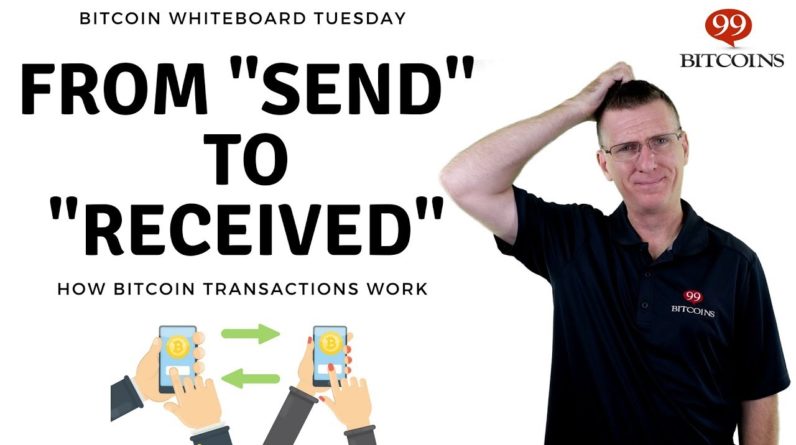
(pensive electronic music) – [Narrator] The birth of the technology. Bitcoin was created thanks
to a movement of libertarians known as a Cypherpunks. These were composed of
cryptographers, programmers, and privacy activists,
a group with one dream, that of creating an electronic
cash system for the Internet. It's important to understand
that Bitcoin was not the first attempt of
creating an online currency secured by cryptography. In 1989, the first
electronic cash the world had ever seen was named digicash. This form of electronic cash, or e-cash, allowed for the possibility of
private online transactions.
A decade later, a computer
engineer and Cypherpunk named Wei Dai attempted
a new electronic cash called b-money. B-money was an anonymous, distributed electronic cash system, but it also used contracts
which allowed for bookkeeping and cryptography for digital signatures, otherwise known as public keys. This proposal shares a lot of properties with how Bitcoin functions today. As a matter of fact, Satoshi Nakamoto, the creator of Bitcoin,
reached out to Wei Dai in order to create a
more sophisticated form of b-money's fundamental technology, giving birth to Bitcoin.
So what made Bitcoin's technology
different and therefore a more suitable form of online currency? One word, blockchain. Bitcoin was the very first form of a completely decentralized
electronic cash, meaning that Bitcoin would not rely on any trusted third party in order to operate. Bitcoin created disintermediation
and a real peer-to-peer electronic form of cash
independent of any individual and completely outside
of any banking system. – The internet is entering a
second era, and for 40 years, we've had an Internet of information.
Now we're getting an Internet of value. – What Bitcoin did in its
first two years of existence is not replicatable. This is what makes it decentralized. It's not because some guy is
funding a bunch of developers that made it decentralized. That's not how it works. It was decentralized because
it was a grassroots effort, not knowing if it was
ever going to have value, and the fact that it was able
to spread around the world, the fact that there are
hard drives in landfills with thousands of Bitcoin on 'em is what needed decentralized, and no other coin will ever have that. (keyboard tapping) – [Narrator] Bitcoin uses
blockchain technology as the backbone of its
decentralized network. A simple way to look at the blockchain is that it is a digital
ledger which contains a record of every transaction ever
made, an immutable, open ledger which can never be altered
since there are thousands of computers across the world
simultaneously confirming that the list of
transactions has not changed, making Bitcoin the most secure and safest network ever created.
– Bitcoin's so simple. It's just a ledger, and it has to do a couple
of things really well. One is it has to be as maximally
decentralized as possible, which he does a pretty good job of. Secondly, it has to enforce
the 21-million hard cap. Everything else is a bonus. If it can do those two things, it means we don't have
currency debasement with it, and anyone can send it to anyone. It's just beautifully simple, but what do you get off the back of that? You get people able to send
money to people they need.
You get a country able to defend itself against the U.S. dollar in El Salvador. You get companies able
to protect themselves against currency debasement
as well as individuals. You get people who are able to save, and it's just a beautiful thing, and all it is, it's just a ledger. – Yeah, I worked in banks. We would have loved to have
had a system with 10 years with essentially no downtime. That's phenomenal. There's no such thing. And to have such high
amounts of transactions going through Bitcoin every
10 minutes and to have never really gone down in 10
years is unheard of. I think it's a sign of the
hard work that many people have put through, whether that's
the miners, the core devs, the people running nodes,
the people running exchanges. It's quite complimentive achieve that.
– [Narrator] The genius of
Bitcoin are its incentive models which offer rewards to
anyone who helps contribute to the security of the network. These people, who keep a
copy of the Bitcoin ledger, are called miners, and mining is done
through computing power. So, how do miners secure the network? They do so using a protocol
called proof of work. Proof of work is a method that ensures that entering information onto a block is incredibly difficult to do,
costly, and time-consuming.
The Bitcoin network creates
a mathematical problem for miners to solve. Miners use their advanced
computers to compete in solving this
cryptographic maths problem, offering guesses or hashes
quintillions of times per second in order to eventually
find that magic number. Once the number is found,
the block is completed, and the transactions become validated. The miner who finds the
correct answer is then rewarded with some Bitcoin for their work.
– When you hear the term mining, 99.9% of that is going to be
what's called proof of work. So the algorithm that gives
you the decentralization, the part of the blockchain
that's super clever, that enables it to maintain itself, that is done by allowing people
to form a consensus opinion. Now, how do you know they're people? By doing something that's mathematically really, really complicated and solving a mathematical problem, you are proving that
you are a real person, or in this case, a real machine. Something is actually being done. When you hear of hundreds of
thousands of Bitcoin miners, actually what you've got is a
handful maybe of 20, 30 pools.
These are the people that actually fill in the block template and
submit the block template onto the blockchain. Add lots and lots, hundreds of
thousands, millions perhaps, of computers that are just
trying to solve a simple sum. So they're huge prime numbers, and there are some, as soon as
somebody manages to solve it, they submit it to the
pool, and the pool goes, "Oh my goodness, this is great. "This means we have solved a block, so we get the block reward,"
and the block reward, 12 Bitcoin or whatever, it
gets paid out to the pool which they then distribute to all these millions and millions of people.

This is why you hear about
people Bitcoin mining, Ethereum mining, or
whatever they're doing. They're mining because
they would like to receive some crypto currency directly as it gets emitted by the blockchain, and why does the blockchain emit? Well, the blockchain emits
because whoever came up with Bitcoin in the first place realized if we make each block that
gets added to the blockchain emit a reward in tokens, in Bitcoin, that encourages people to get involved and to be part of the Bitcoin network. So it's a self-rewarding system
that also is self-policing. It's a secure system through
consensus and distribution. – [Narrator] One complaint
about Bitcoin is that it required a lot of
energy in order to find the answer to each question.
However, some argue that the more energy that is used to secure the blockchain, the more secure it becomes
as it would require an almost impossible amount
of energy for any individual to try and alter the chain. Between 2018 and 2019, Kuwait was among the cheapest
countries to mine Bitcoin through renewable energy and solar power. The cost to mine one Bitcoin averaged between 1,700 and 1,900 USD. When it comes to concerns
with energy consumption, it is key to understand that
over 70% of Bitcoin mining comes from this renewable energy. – What you do is you give
every human being on the planet access to every financial
network on the planet.
I can do a bank transfer in
any country in the world, and I do it here too to
pay my rent here in London. I don't have an English bank account yet, and my bank account in
New York, Bank of America, won't let me do a wire internationally unless I'm physically in the branch. This is a big shot American
bank, Bank of America, and they're that ghetto, believe that. Where do I do? I go into
Paxful, I sell some Bitcoin. Bom, the deal is done.
Isn't that beautiful? I can access any bank account in the world or any financial network in the world.
I was in China. I wanted to charge my phone at a kiosk. They took Alipay or WeChat. I didn't have Alipay or WeChat account. Went onto Paxful, sold come Bitcoin, and the guy sent it for me. I gave him the QR code, done. – [Narrator] What about the
transactions in the blocks? Every transaction registered in the blocks are confirmed by the Bitcoin miners, and a new block is created
roughly every 10 minutes. Once the block is created, it is verified by every single person who is currently hosting
the network meaning that once everyone agrees for
the block to be created, it cannot be changed. This is what makes the
ledger decentralized. No individual person nor
miner, as they are known, can make a change to the network without every other individual
agreeing to make the change.
This is what makes Bitcoin
an immutable truth. – The main thing about
this is that individuals can independently take
control of their finances, and they can decide what software to run, which consensus rules to follow, and then they become a participant in the security of the system. That's empowering. So that's the most
important thing to realize about this technology. – [Narrator] What about
Bitcoin's scalability for mass adoption? One of the biggest challenges
for Bitcoin is to scale enough for one, billions of people to use, two, to process 100k
transactions per second, and therefore compete with
centralized networks like Visa, and three, allow for micro transactions that are almost free to make. – This is the main problem
that everyone talks about is like, oh, it's not scalable enough. This is what the L2,
the layer-two solutions, are trying to do in Ethereum. This is what Avalanche, Solarna,
Polka Dot, Cosmos, Radix, all of these, they're ones
that are solving the problem, but I think often we come at
it from the wrong perspective.
For years in the crypto
industry where people were like "How can this be mainstream
if we're not matching Visa," which is 2,000 transactions per second. I kind of find that a bit
hilarious because it's like measuring how much bandwidth we need like when the internet first came out, and you can imagine people were like, "Wow, we've got this network of computers "that we can share information seamlessly, "but like how much bandwidth do we need?" Early ISPs trying to work out how much bandwidth they need. And it would be a little
bit like trying to calculate how much bandwidth you need by working out how many telephone calls and faxes are being sent at the moment. Now, we understand
intuitively that the bandwidth of telephone calls and faxes, nothing compared to what the
Internet actually represented. The Internet was a wholesale rethinking of how information was shared, and it was millions of times
the bandwidth was required from the information sharing that happened pre-Internet to post-Internet. We're at that precipice for
the global financial system. – If you go to the bank or
Wells Fargo, anywhere else, and try and send three
dollars into South Africa or Rwanda or Philippines into the- If you try and send a
small amount of money, you'll find that you're
absolutely shut out if you don't use the
existing banking system, and even in the banking system, you'll see the fees are massive.
Crypto cuts that out. If you can pay somebody with
crypto, all of a sudden, you don't need to have these monster fees that come with with the
international transfers. – So some people have built
side chains as a layer on top of Bitcoin so that
you don't have to worry about Bitcoin transaction fees or block times, and it's a faster transfer
mechanism of Bitcoin. – [Narrator] Unfortunately, decentralized networks
that rely on transactions being made on chain
are extremely difficult to scale as of today.
This is because blockchains
are considered flood networks meaning in order for a
transaction to be made, all previous transactions need
to be checked and verified to assure that new payments are valid. Because of this, it is difficult
to have decentralization, security, and speed all together. Bitcoin is secure and decentralized, but those things come at a cost of speed. Luckily enough, we have
secondary scaling solutions to solve this problem. One example of a scaling solution
is the lightning network, which is a layer-two payment
protocol that enables fast transactions among
participating nodes and has been touted as a solution to the Bitcoin scalability problem. It solves the problem
of speed by allowing for many transactions to be made
outside of the blockchain and then consolidated
into a single transaction, which reduces the amount
of data being added to the blockchain in any given block, therefore allowing for more
transactions to be made in a shorter amount of time.
– Lightning has kind of put
another layer on top of Bitcoin where developers can
come in and be creative, and that's why you've seen
quite a lot of interest and apps that have been built,
but essentially lightening, It's a way of caching transactions. I mean, I'm trying to talk
about it at highest level, but the way I see it, it's
this cache on top of Bitcoin. Now, you have payment channels, which allow people to route
messages across each other, but I viewed them as all kind of caches. – So few transactions are
gonna be done on chain because you can't scale
on chain transactions. You've gotta scale them
off chain, and off chain, Bitcoin has a dozen good
proposals to give you privacy and fungibility
as a second-layer solution through wallets, through
Lightning, through Liquid, and through a lots of other
innovations that are coming between Taproot and Bulletproofs and the latest in Schnorr signatures. Bitcoin will have sufficient privacy for the needs of consumers. – [Narrator] In the last decade
and since Bitcoin's birth, we have witnessed great progress
in Bitcoin's technology, including mining efficiency,
the proof-of-work mechanism, overall ease of use,
Bitcoin's public persona and therefore overall adoption.
In the next decade, we
look forward to seeing scaling solutions that
allow Bitcoin to surpass the current financial system
in terms of capabilities and usefulness to society. The possibilities of Bitcoin
as a ubiquitous payment method that offers complete
transparency and immutability are endless.
(upbeat electronic music).




